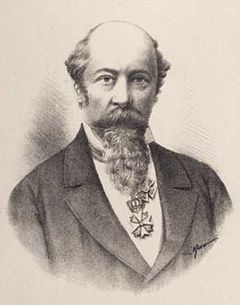- Medo Pucić
-
Medo Pucić 
Born March 21, 1821
Dubrovnik, Kingdom of Dalmatia, Austrian EmpireDied June 30, 1882 (aged 61)
DubrovnikOccupation poet Nationality Serb[1] Medo Pucić, also known as Orsat Pucić, (Italian: Orsatto Pozza;[1] March 12, 1821 - June 30, 1882) was a writer and politician from Dubrovnik, at the time in the Austro-Hungarian Kingdom of Dalmatia, who was the first Catholic native of Dubrovnik to declare himself a Serb,[1] believing that the religion was irrelevant for ethnic affiliation, contrary to the common practice in Ragusa[2] and in line with Pan-Slavic ideas of Pavel Jozef Šafárik and others.[3]
Contents
Biography
Pucić was born on March 21, 1821 in Dubrovnik, then in Austrian Empire. He was descended from the House of Pucić, an old noble family of Republic of Ragusa. He attended the lyceum in Venice, where in 1841 he became acquainted with Jan Kollár.[1] Pucić was impressed with his pan-Slavist ideas, and went on to join the Illyrian movement. From that impression of Pan-Slavism, came Pucić's joining to the idea of Serb Catholics.
 Medo Pucić
Medo PucićHe studied between 1841 and 1843 in the University of Padua, and then from 1843 to 1845 he studied law in Vienna and was a Knights Hospitaller of Sovereign Order of Saint John. Pucić lived in the cities of Lucca and Parma between 1846 and 1849, and after that usually in Dubrovnik. Pucić was in active contact with cultural and political circles of Central Croatia, the rest of the Austrian Empire, and different countries of Europe. After 1860 when the political life in the Austro-Hungarian Monarchy was revived, he took part in the Serbian and Croatian national movements in Dalmatia and the politics in Croatia proper. Pucić as a leader of the conservative faction wedded the theory of the Croatian historical right to the Dalmatia to the convoluted ethno-linguistic arguments originating in early Slavonic studies circles (Kollar, Šafárik, Dobrovsky,..) which considered all native Shtokavian speakers as Serbs; later that century the theories about linguistic demarcation of Serbs and Croats, and hence the ethno-historical "ownership" of Dubrovnik and Kotor, had been subsumed in the ideology of Serbo-Croatism, a sort of cover term which considered Croats and Serbs as tribes of a single South Slavic nation. Medo Pucić was a vocal supporter of the unification of all the South-Slavic lands within the Habsburg Monarchy around one nation, called later Yugoslavia.
Pucić's pan-Slavic (or pan-South-Slavic) idea was based on the principle of unification of Croats with the Slavic tradition in Dubrovnik.
In 1868, he moved to Belgrade to become a teacher to the young prince Milan Obrenović IV until he came of age in 1872. He returned to Dubrovnik in 1874, and played an important role in the cultural life of the city in the 1870s.
Literary Works
Pucić wrote lyrical and epic poems, patriotic lyric poetry, political essays and historical studies. The preferred motive of his work was the history of Dubrovnik and the Republic of Ragusa. He also translated literary works from several European languages into his own Dubrovnik dialect, which he declaratively considered Serbian, but which was at that and later time (until the dissolution of Yugoslavia) widely understood as a hodgepodge quasi-unity of a so-called Serbo-Croatian, and translated various Croatian and Serbian works into Italian, which is when he used the name Orsatto Pozza.
Pucić started writing poetry in 1840. He was initially writing romantic lyrics, but later moved towards a more national epic style. Some of his more important works include:
- Slovjanska antologija iz rukopisah dubrovačkih pjesnikah (Slavic Anthology from the Manuscripts of Dubrovnik Poets), 1844
- Talijanke (Italian Women), 1849 (elegies)
- Spomenici srpski od godine 1395. do 1423. (Serbian monuments from Year 1395 to 1423), book I, Belgrade 1858 and book II, Belgrade 1862
- Dei canti popolari illirici, discorso detto Adam Mickiewicz, Zara 1860
- Giovanni Gundulich. vita (Ivan Gundulić), from Favilla journal, Trieste, 1843, №XIX, p. 293-301
- Pjesme (Poems), 186 and 1879
- Karađurđevka, 1864
- Kasnachich G. (Giovanni) Augusto e O.P (Orsato Pozza) sugli slavi from giornale Dalmazia 1847 n. p. 43
- Le nozze di Platone, o dialogo dell amore, tradotto nell´occasione delle nozze di sua sorella Anna (con Marino Giorgi) dal Conte Orsato Pozza, Trieste 1857
- Compendio della storia di Ragusa dall´originale italiano di G. Resti per cura di O. Pozza, Zara 1856
See also
References
- ^ a b c d Banac 1983, pp. 455
- ^ Banac 1983, pp. 452
- ^ Banac 1983, pp. 451
- Banac, Ivo (1983). "The Confessional "Rule" and the Dubrovnik Exception: The Origins of the "Serb-Catholic" Circle in Nineteenth-Century Dalmatia". Slavic Review 42 (3): pp. 448-474. http://links.jstor.org/sici?sici=0037-6779%28198323%2942%3A3%3C448%3ATC%22ATD%3E2.0.CO%3B2-O&size=LARGE. ([1])
External links
- Đorđe Živanović: Mickiewicz in Serbo-Croatian literature, from Projekat Rastko
- Constantin Wurzbach: 23 Biographisches Lexikon des Kaisertums Österreich Dreiundzwanzigster Teil Podlaha - Prokesch (1872) (German)
Categories:- 1821 births
- 1882 deaths
- People from Dubrovnik
- Serbs of Croatia
- Serbian writers
- Serbian Roman Catholics
- Book and manuscript collectors
Wikimedia Foundation. 2010.
